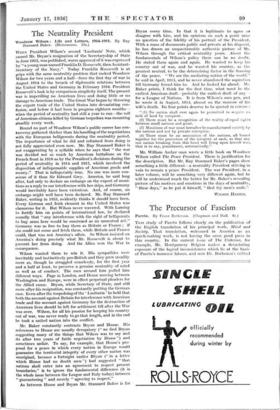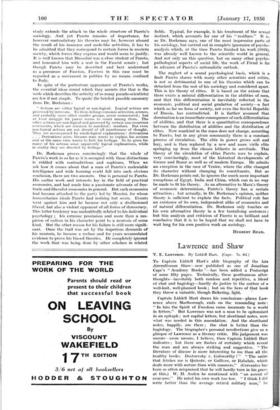The Precursor of Fascism
Pareto. By Franz Borkcnau. (Chapman and Hall. Os.) Tins study of Pareto follows closely on the publication of the English translation of his principal work, Mind and Society. That translation, welcomed in America as an epoch-making work, is not having the same good press in this country. In the current issue of The Criterion, for example, Mr. Montgomery Belgion makes a devastating exposure of the logical inconsistences which lie at the basis of Pareto's immense labour, and now Dr. Borkenau's critical
study extends the attack to the whole structure of Pareto's sociology. And yet Pareto remains of importance, for however contradictory his theories may be, however absurd the result of his immense and mole-like activities, it has to be admitted that they correspond to certain forces in modern society, which forces they express and would seem to justify.
It is well known that Mussolini was a close student of Pareto, and honoured him with a seat in the Fascist senate ; but though Pareto may be described and best understood as a precursor of Fascism, Fascism in this case must be regarded as a movement in politics by no means confined to Italy.
In spite of the portentous appearance of Pareto's works, the essential ideas round which they accrete. (for that is the verb which describes the activity of so many pseudo-scientists) are few if not simple. To quote the briefest possible summary from Dr. Borkenau
" Actions are either logical or non-logical. Logical actions are governed by interests. To them belong economic activities, science, and probably sonic other smaller groups, never enumerated ; but at least struggle for power seems to count among them. The 'other actions are non-logical and governed by certain non-recurrent sentiments, which are common to mankind : residues. But even 'non-logical actions are not devoid of all interference of thought. They are accompanied by simili-logical explanations : derivations . . . Derivations arise, because man wants to explain his actions and at the same time wants to hide his feelings. So he gives for .many of his actions some apparently logical explanations, while in reality they are directed by feelings.'
Dr. Borkenau proves convincingly that the whole of Pareto's work in so far as it is occupied with these distinction's is riddled with contradictions and sophisms. When we ask how it comes about that a man of Pareto's undeniable intelligence and wide learning could fall into such obvious confusion, there are two answers. One is personal to Pareto. His earlier work and interests lay in the field of practical economics, and had made him a passionate advocate of free- trade and liberalist economics in general. But such economies had become attached to the party led by Mazzini, for whose humanitarian ideals Pareto had nothing but scorn. Events went against him and he became not only a disillusioned liberal, but also a violent opponent of all forms of democracy. This latter tendency was undoubtedly related to his individual psychology ; his extreme pessimism and more than a sus- picion of sadism in his character point to a neurosis of some kind. But the other reason for his failure is still more signifi- cant. Once the trail was set by the imperious demands of his neurosis, he became a recluse and for years accumulated evidence to prove his biased theories. He completely ignored the work that was being done by other scholars in related fields. Typical, for example, Is his treatment of the sexual instinct, which accounts for one of his " residues." It is, as Dr. Borkenau says, one of the most impressive parts of his sociology, but carried out in complete ignorance of psycho- analysis which, at the time Pareto finished his work (1919), was already well known to the scientific world in general. And not only on this question, but on many other psycho- pathological aspects of social life, the work of Freud is far in advance of Pareto's rationalistic outlook.
The neglect of a sound psychological basis, which is a fault Pareto shares with many other scientists and critics, is not so detrimental to one of his theories which can be detached from the rest of his sociology and considered apart. This is his theory of elites. It is based on the axiom that there exists a natural differentiation in the abilities of men, and that this differentiation is inevitably reflected in the economic, political and social gradation of society—a fact which so far no form of society, not even the Soviet Republic of Russia, has contradicted. It is further assumed that domination is an immediate consequence of such differentiation of abilities, and that there is a quantitative correspondence between the distribution of abilities and the distribution of elites. Now mankind in the mass does not change, according to Pareto, but in any given community there is a constant process of circulation. The elite in power grows soft and lazy, and is then replaced by a new and more virile elite springing up from the classes hitherto in servitude. This theory of the circulation of elites Pareto uses to explain, very convincingly, most of the historical developments of Greece and Rome as well as of modern Europe. He admits an exception in the case of Venice, where the elite changed its character without changing its constituents. But as Dr. Borkenau points out, he ignores the much more important exceptions of Egypt, India and China, which can in no way be made to fit his theory. As an alternative to Marx's theory of economic determinism, Pareto's theory has a certain attraction ; but actually, in Dr. Borkenau's opinion, neither theory is sufficient to explain the facts. Political rule has an existence of its own, independent alike of economics and of natural differentiation. Dr. Borkenau only touches on his own alternative theory in a few tantalising sentences ; but this analysis and criticism of Pareto is so brilliant and conclusive that it is to be hoped that we shall not have to wait long for his own positive work on sociology.
HERBERT READ.







































 Previous page
Previous page